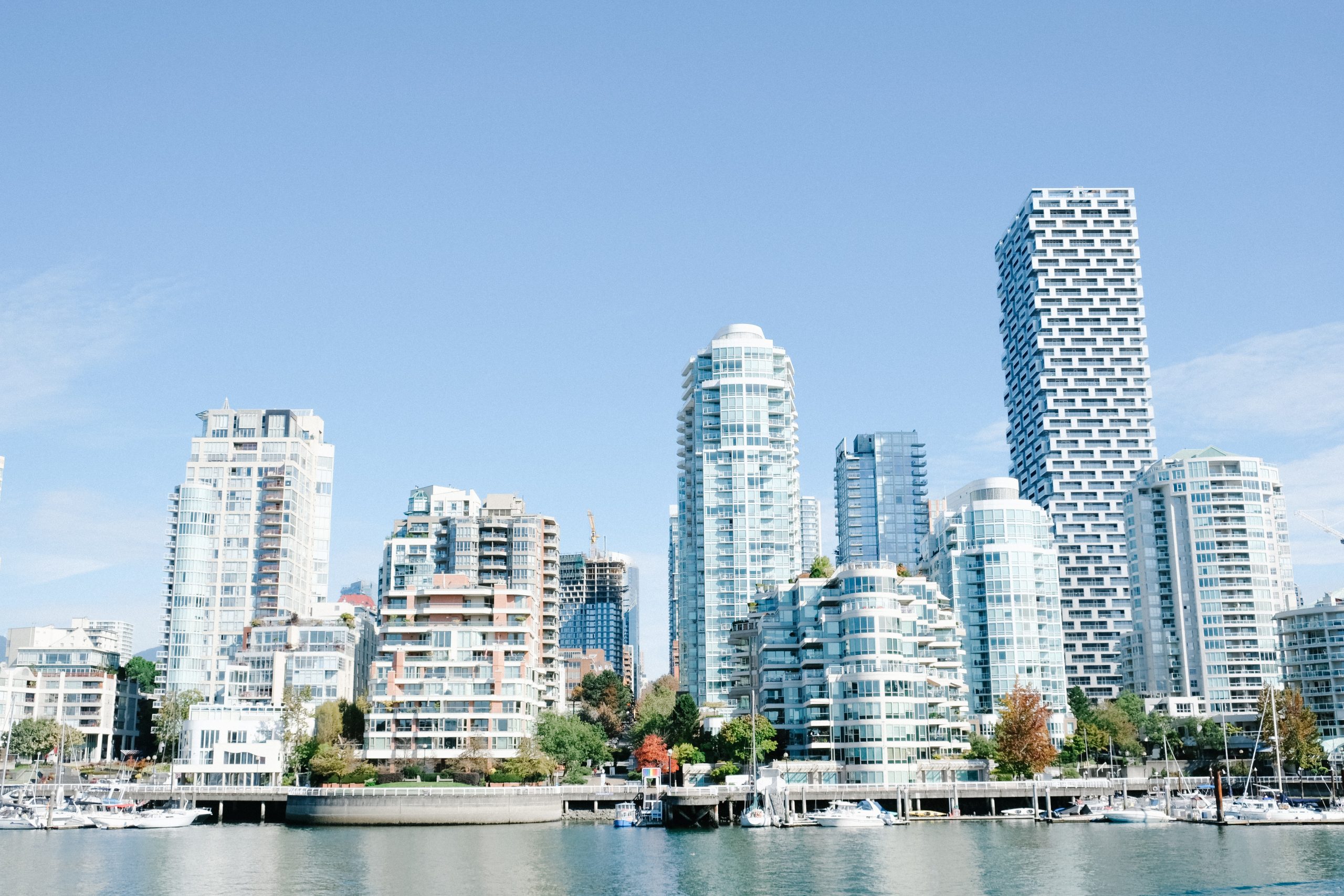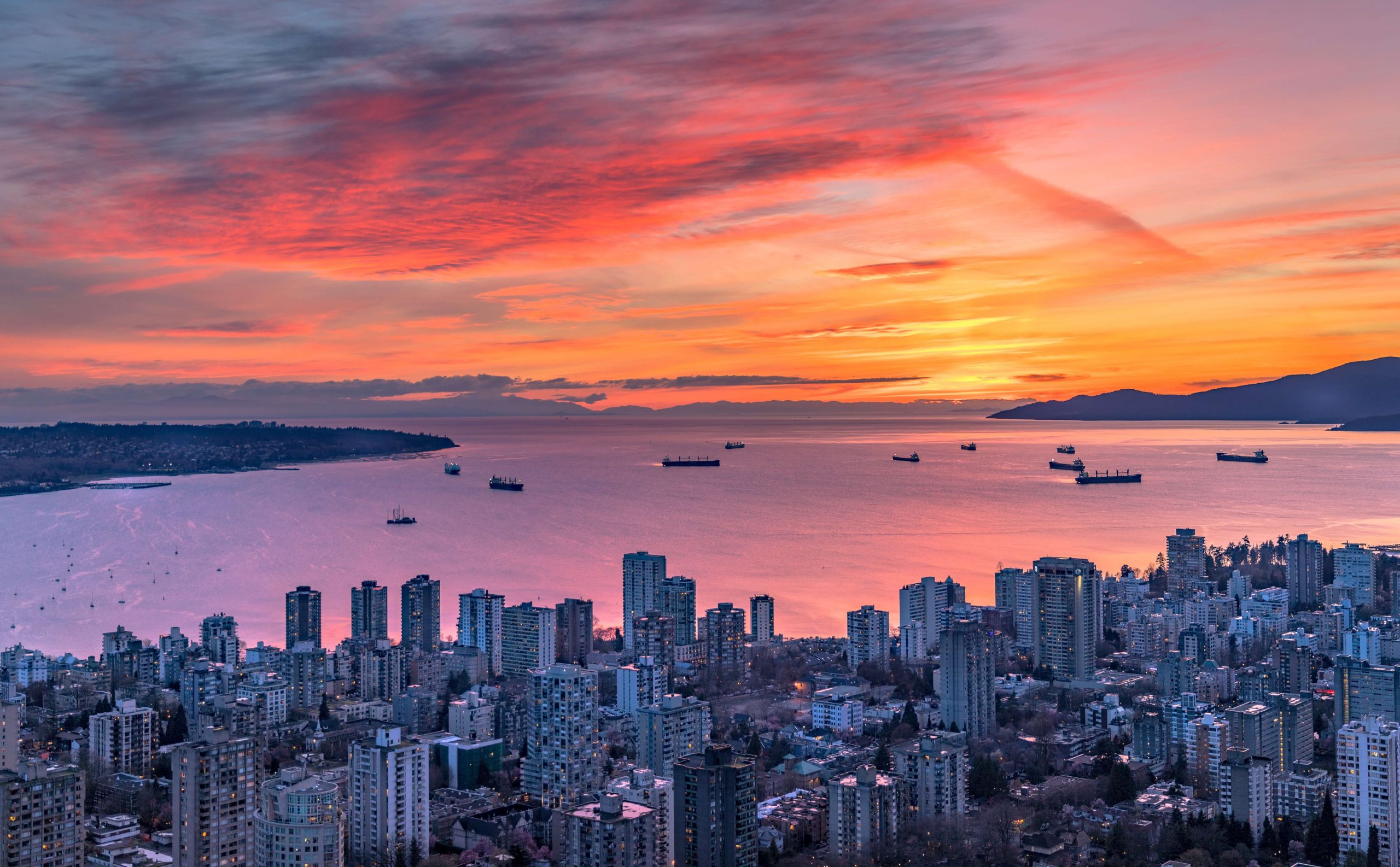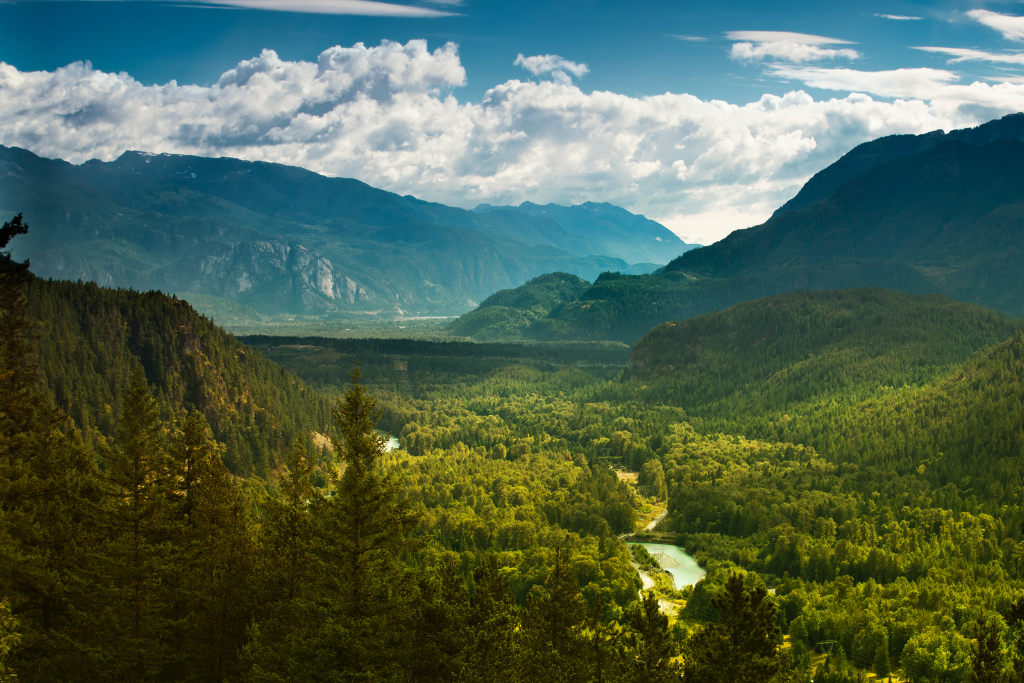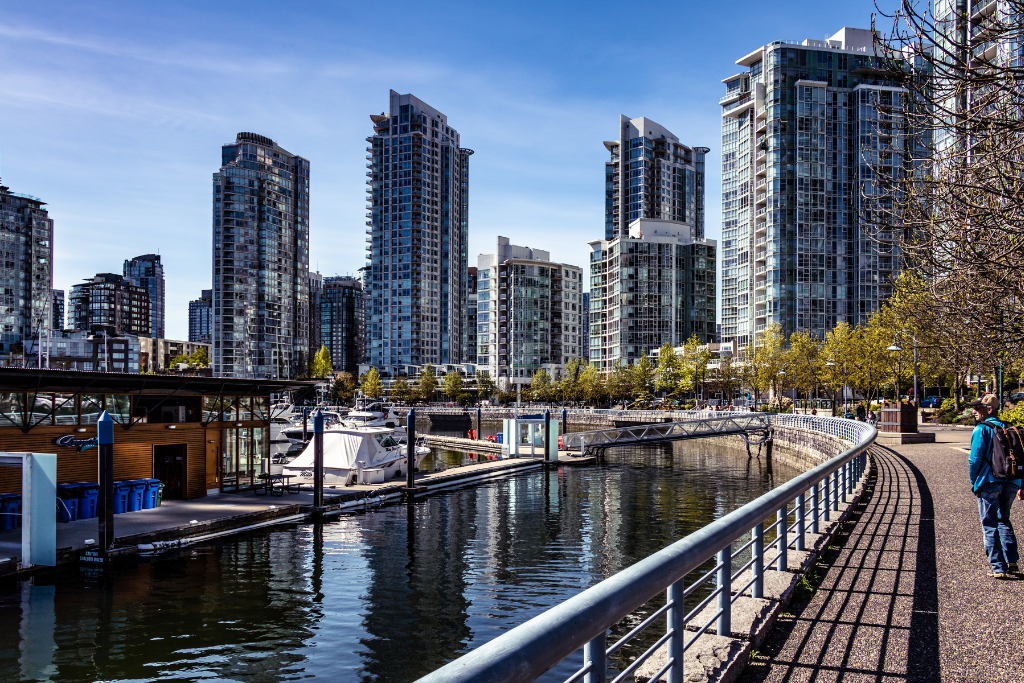1. First steps before moving to Vancouver
Finding a job
Vancouver is a city that offers a wide range of career prospects across multiple sectors. Whether you’re seeking opportunities in tech, healthcare, tourism, or sustainable industries, Vancouver has something to offer. To begin your job search in this vibrant coastal city, consider using online job search platforms like Indeed, LinkedIn, and Glassdoor to find job listings. Additionally, you can take advantage of local resources for jobseekers, including government employment services and local career counseling centers.
Getting there
To travel from Toronto to Vancouver, the quickest option is to take a direct flight from Toronto Pearson International Airport (YYZ) to Vancouver International Airport (YVR). The flight duration is approximately 4 to 5 hours.
Alternatively, you can opt for VIA Rail’s “The Canadian” train, which travels from Toronto to Vancouver, covering approximately 4,466 km. This scenic choice provides beautiful views of the Canadian landscape, but it’s a longer journey, lasting around four days.
Another option is to select a bus journey with companies such as Greyhound or Megabus, or you can drive by car. The road trip takes approximately 40 hours of continuous driving.
What are the Best Movers From Toronto to Vancouver?
Are you moving light, or are you moving all your belongings and more to Vancouver? That’s the first question to ask yourself. Moving to Vancouver from Toronto can be a handful considering its distance. It’s about more than 4,000 km away from each city. The process can be a disaster if you do not select the best moving solution for you.
Renting a moving truck is practical if you are only moving with the bare minimum. When booking with the rental truck company, make sure they accept one way travels. This means you can leave the car at another company’s location.
If you prefer letting the professional handle your move, there are many great Toronto to Vancouver moving companies with good reputations that you can trust. If they have accreditation from organizations like Better Business Bureau and the Canadian Mover’s Association, it’s even better.
Must dos before your arrival in Vancouver
- Update Your Address: Changing your address is a crucial step when moving. You can easily complete this process using our free change of address service. To ensure you don’t miss any essential information, refer to our comprehensive change of address checklist in British Columbia.
- Housing Arrangements: Ensure a smooth relocation by securing temporary lodging and exploring long-term housing options.
- Cost of Living Analysis: Make informed decisions by conducting thorough research on living expenses, including housing, groceries, transportation, and healthcare in advance.
2. Upon your arrival in Vancouver
Must dos right upon your arrival
- Get familiar with your neighborhood and note important emergency numbers.
- Locate essential facilities like the nearest hospital, police station, and fire department for safety in emergencies.
- If you plan to move around the city of Vancouver for work or leisure, consider purchasing a monthly transit pass to save money.
Vancouver’s public transportation system is efficiently managed by TransLink, the authority overseeing the comprehensive regional transportation network of Metro Vancouver. To get a better idea, you can review the transit maps. This network offers a seamless and pleasant commuting experience through its diverse modes of transportation, including:
- Buses
- SkyTrain
- SeaBus
- West Coast Express
Here are Vancouver’s public transport rates:
| Type of fare | Rate |
| Single ticket
(1-Zone) |
$3.15 |
| Single ticket
(2-Zone) |
$4.55 |
| Single ticket
(3-Zone) |
$6.20 |
| Daily pass
(All Zones) |
$11.25 |
| Monthly Pass
(1-Zone) |
$104.90 |
Exchanging your driver’s license
When relocating to Vancouver, it’s crucial to promptly update your driver’s license and vehicle registration through the Insurance Corporation of British Columbia (ICBC). You have a 90-day window to switch to a BC driver’s license, either by contacting ICBC or using MovingWaldo’s free change of address service.
This address change is mandatory, as it is required by law. Failure to do so could result in a fine if the address on your driver’s license is no longer valid.
For more detailed information, please refer to our article on how to change your address on your driver’s license in British Columbia.
Setting up a bank account
When moving from Toronto to Vancouver, it’s crucial to establish a local presence by setting up a bank account. Before selecting a bank, compare institutions for the best returns, lowest administration costs, and the option to open your account remotely before arriving in Vancouver.
Some banks have a presence in both cities. To make this transition smoother, inquire in advance about how to change your home branch with the bank. You should also inform your bank of your new mailing address to receive any statements or other communications.
To do this, visit the bank you wish to select as your new home branch. Some banks with a presence in both cities include the Royal Bank of Canada (RBC), Toronto-Dominion Bank (TD Bank), Bank of Nova Scotia (Scotiabank), and Canadian Imperial Bank of Commerce (CIBC).
Getting health insurance
Having health insurance is like having a safety cushion for your health. It prevents you from being burdened with significant bills during medical emergencies. If you reside in Vancouver, you are covered by British Columbia’s healthcare system (MSP). They take care of important expenses like doctor visits, maternity leave, and tests such as lab work and x-rays.
However, it doesn’t cover regular dental and eye checkups, alternative treatments, or prescription drugs. To obtain more comprehensive coverage, you can either purchase private health insurance or use the plan provided by your employer.
| Type of healthcare | Cost |
| Employer-sponsored health insurance | $63.00 |
| Non-employer-sponsored health insurance (average cheapest) | $82.20-$191.60 |
| Gym | $60.94 |
Numbeo (Sept 2023), Hellosafe (2023) & Insurance Business (Apr 2023)
3. Best places to live in Vancouver

While you are researching for additional information about where you should live in Vancouver, you may have come across someone saying that the city is a mix of urban lifestyle and outdoor fun. That is indeed true, and we list the best areas to live in the city when moving.
| City | Characteristics |
| Gastown | Mixed area, upscale housing |
| Yaletown | Lively nightlife, public art |
| Main Street | Local chic, arts, ceramics |
| Olympic Village | Green, innovative techniques |
Setting up home services
In Vancouver, whether you’re a homeowner or a renter, one of the key budget considerations is your basic utility expenses. In British Columbia, the cost of electricity is environmentally friendly, mainly sourced from clean and renewable sources. Alongside this, it’s essential to consider your internet services. Some of the major internet providers in Vancouver are TELUS, Oxio, VMedia and TekSavvy.
| Utilities | Cost |
| Basic
(Electricity, Heating, Cooling, Water, Garbage) for 915 sq ft Apartment |
$144.08 |
| Internet
(60 Mbps or More, Unlimited Data, Cable/ADSL) |
$85.50 |
| Total | $229.58 |
Should you rent or buy?
In 2023, on average, a house in Vancouver costs around $1,208,400. If you’re considering renting, a one-bedroom apartment outside the city center will cost you about $2,240.70.
Vancouver has a competitive housing and real estate market, with average home prices exceeding the national average. As a result, it’s one of the more expensive cities in Canada to purchase a home, alongside Toronto.
However, Vancouver’s natural surroundings, with the ocean and mountains nearby, are designed to harmonize with nature. The city boasts pleasant weather and has a strong economy, particularly in industries like tech and film production. Therefore, residents here get to enjoy the best of both worlds.
Cost of rent in Vancouver
| Area/Neighborhood | 1-bed apartment | 3-bed apartment |
| Vancouver (Outside of Center) | $2,240.70 | $3,791.40 |
Cost of buying a property in Vancouver
| Area/Neighborhood | Average home price |
| Vancouver | $1,208,400 |
4. Cost of living in Vancouver vs. Toronto
Vancouver’s cost of living
| Category | Monthly cost |
| 1 bed apt rent outside city center | $2,240.70 |
| Groceries
Numbeo’s grocery list ($93.94 multiplied by 4) |
$375.76 |
| Utilities
Electricity, heating, cooling, water, garbage |
$144.08 |
| Internet with 60 Mbps | $85.50 |
| Transit pass | $104.90 |
| Entertainment
Meal, taxi, movie |
$108.00 |
| Gym membership | $60.94 |
| Total | $3,119.88 |
Toronto’s cost of living
| Category | Monthly cost |
| 1 bed apt rent outside city center | $2,280.60 |
| Groceries
Numbeo’s grocery list ($88.59 multiplied by 4) |
$354.36 |
| Utilities
Electricity, heating, cooling, water, garbage |
$208.67 |
| Internet with 60 Mbps | $76.09 |
| Transit pass | $156.00 |
| Entertainment
Meal, taxi, movie |
$104.00 |
| Gym membership | $72.73 |
| Total | $3,252.45 |
5. The weather in Vancouver
Vancouver, situated on the west coast of Canada, enjoys a temperate maritime climate. Summers, running from June to August, are the favored time to visit, featuring mild, dry weather with temperatures around 20 °C. Winters, running from December to February, are milder than in many other parts of Canada, with temperatures ranging from 3 °C to 10 °C.
It’s worth noting that Vancouver’s weather can be quite changeable, and rain is a frequent presence throughout the year, especially during the fall and winter, so be prepared for it.
6. What to do as a local in Vancouver
As a local in Vancouver, you can enjoy the city’s stunning natural beauty. Explore the numerous hiking trails in the nearby mountains, such as Grouse Mountain or Lynn Canyon, and enjoy the breathtaking views.
You can also take walks or bike rides along the seawall in Stanley Park, or spend a day at one of the city’s beautiful beaches for water sports.
Immerse yourself in the arts and culture scene by attending local concerts, art exhibitions, and theater productions. Vancouver is often referred to as “Hollywood North” due to its thriving film and television industry, so don’t be surprised if you appear in one casually walking around the city.
Vancouver offers a wealth of activities that cater to all interests and seasons, making it an exciting place to call home.
7. Fun facts about Vancouver
- Stanley Park is a massive urban park in Vancouver, larger than New York City’s Central Park.
- It is also known as “Hollywood North” for its popular filming location for movies, series, and TV shows, including the Twilight series, Supernatural, Prison Break, Dr. House, The Last of Us, X-Men, and Deadpool.
- Vancouver’s temperate coastal climate means mild winters with little snow and warm summers, making it ideal for year-round outdoor activities.
- It is one of Canada’s most ethnically diverse cities, showcased in its vibrant neighborhoods, cuisine, and cultural festivals.
What Are the Benefits of Moving to Vancouver From Toronto?
- Housing prices in Vancouver and Toronto are quite high. However, in the case of Toronto, they have skyrocketed, while Vancouver’s housing rates have stabilized.
- Considering that Toronto is the largest city in Canada and the hub for business, finance, technology, entertainment, and culture, you can expect a more extensive public transportation network. Vancouver’s public transport, on the other hand, is efficient, punctual, clean, and user-friendly.
- Both cities offer a vibrant nightlife. In Toronto, you can expect people to fully embrace city life. You’ll find them attending numerous events and concerts, dining at the city’s diverse and impressive food establishments, and enjoying nights out. In contrast, Vancouver’s nightlife tends to be more low-key.
When comparing the cost of living, you may find Vancouver as expensive as Toronto. The advantage of Vancouver is that, despite being a smaller city than Toronto, you can still enjoy most of what Toronto has to offer. It is still a city with an efficient public transportation network, nightlife, and the added bonus of experiencing nature while enjoying the city life.
Pros and Cons in Moving to Vancouver from Toronto
| Pros | Cons |
|
|
Conclusion
Moving from Toronto to Vancouver is a big step, but it can be an exciting journey. Being well-informed and prepared is essential for a successful move. Understanding the lifestyle and climate differences, embracing Vancouver’s multicultural atmosphere, and following our list of must-knows for moving to BC will make your transition smoother and more enjoyable.
Are you moving soon? Discover the best movers in Vancouver.




